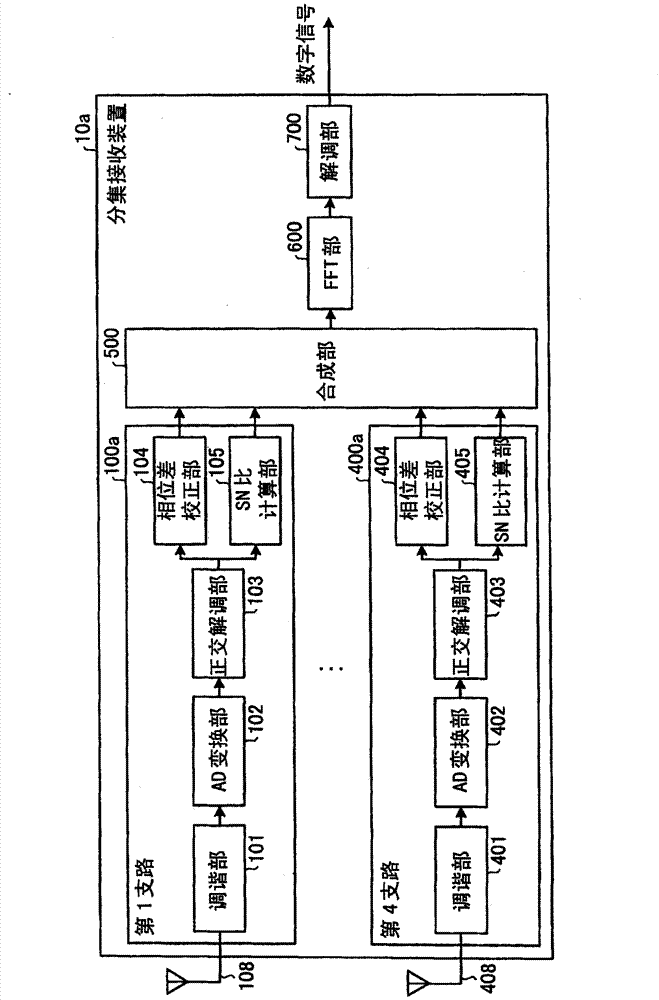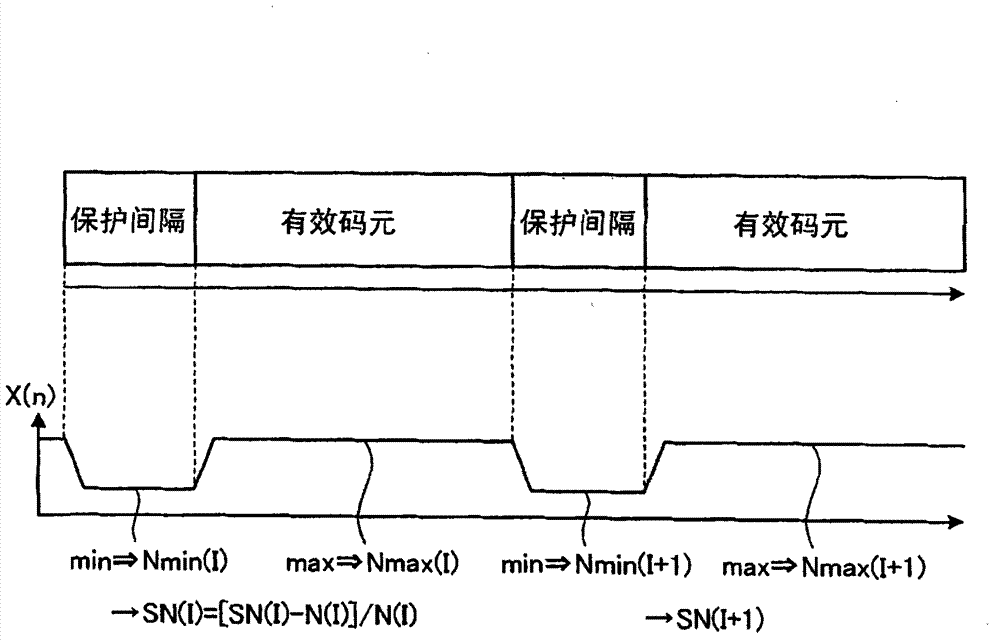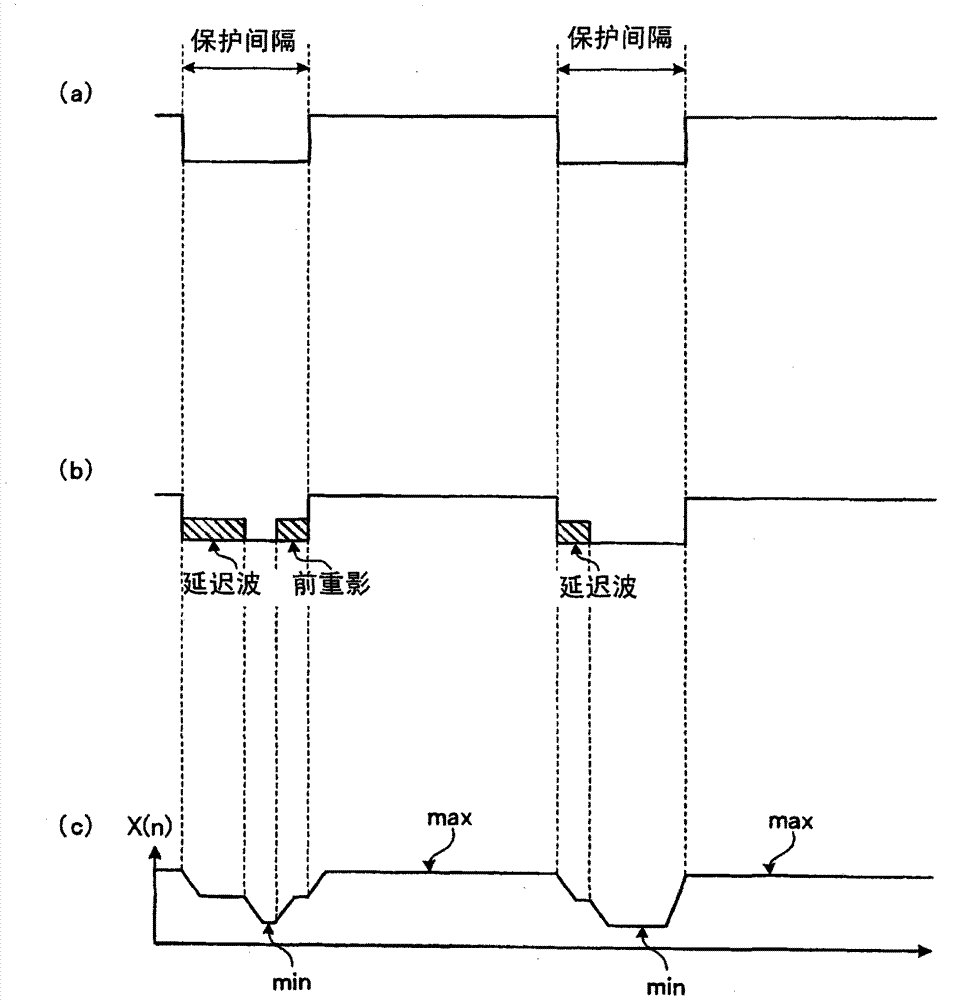Diversity reception device, diversity reception method, and digital television reception device
A technology of diversity reception and signal reception, which is applied in space transmit diversity, digital transmission system, diversity/multi-antenna system, etc., and can solve problems such as complicated and difficult operation and complex circuit structure
- Summary
- Abstract
- Description
- Claims
- Application Information
AI Technical Summary
Problems solved by technology
Method used
Image
Examples
Embodiment 1
[0115] First, the configuration of the diversity receiving apparatus according to the first embodiment will be described. figure 1 is a functional block diagram showing the configuration of the diversity receiving apparatus according to the first embodiment. As shown in the figure, the diversity receiving apparatus 10a according to Embodiment 1 includes, for example, a first branch 100a, a second branch 200a (not shown), and a third branch 300a (not shown) for diversity reception of OFDM modulated signals. shown), the four branches of the fourth branch 400a. In addition, since the configurations of the first branch 100a to the fourth branch 400a are the same, the first branch 100a will be described as a representative. In addition, the number of branches is not limited to four of the first branch 100a to the fourth branch 400a, and any number may be used as long as it is plural.
[0116] In the first branch 100a, the AD converter 102 converts the OFDM modulated signal receiv...
Embodiment 2
[0147] Next, the configuration of the diversity receiving apparatus according to the second embodiment will be described. Figure 5 is a functional block diagram showing the configuration of the diversity receiving apparatus according to the second embodiment. As shown in the figure, the diversity reception apparatus 10b according to the second embodiment, like the diversity reception apparatus 10a of the first embodiment, includes, for example, a first branch 100b, a second branch 200b, a third Four branches of the branch 300b and the fourth branch 400b. In addition, since the configurations of the first branch 100b to the fourth branch 400b are the same as those of the diversity receiving apparatus 10a of the first embodiment, the first branch 100b will be used as a representative for description. In addition, the number of branches is not limited to four of the first branch 100b to the fourth branch 400b, and any number may be used as long as it is plural.
[0148] Regard...
Embodiment 3
[0159] First, the configuration of the diversity receiving apparatus according to the third embodiment will be described. Figure 8 is a functional block diagram showing the configuration of the diversity receiving apparatus according to the third embodiment. As shown in the figure, the diversity receiving apparatus 10c according to the third embodiment includes, for example, a first branch 100c, a second branch 200c (not shown), and a third branch 300c (not shown) for diversity reception of OFDM modulated signals. shown), the four branches of the fourth branch 400c. In addition, since the configurations of the first branch 100c to the fourth branch 400c are the same, the first branch 100c will be described as a representative. Also, the slope of branch number and N is higher than that of other low-pass filters min The slope of the complementary straight line of (I) is large. Thus, if Figure 10-3 As shown, it can be estimated that the complex baseband signal cut off by th...
PUM
 Login to View More
Login to View More Abstract
Description
Claims
Application Information
 Login to View More
Login to View More - R&D
- Intellectual Property
- Life Sciences
- Materials
- Tech Scout
- Unparalleled Data Quality
- Higher Quality Content
- 60% Fewer Hallucinations
Browse by: Latest US Patents, China's latest patents, Technical Efficacy Thesaurus, Application Domain, Technology Topic, Popular Technical Reports.
© 2025 PatSnap. All rights reserved.Legal|Privacy policy|Modern Slavery Act Transparency Statement|Sitemap|About US| Contact US: help@patsnap.com



